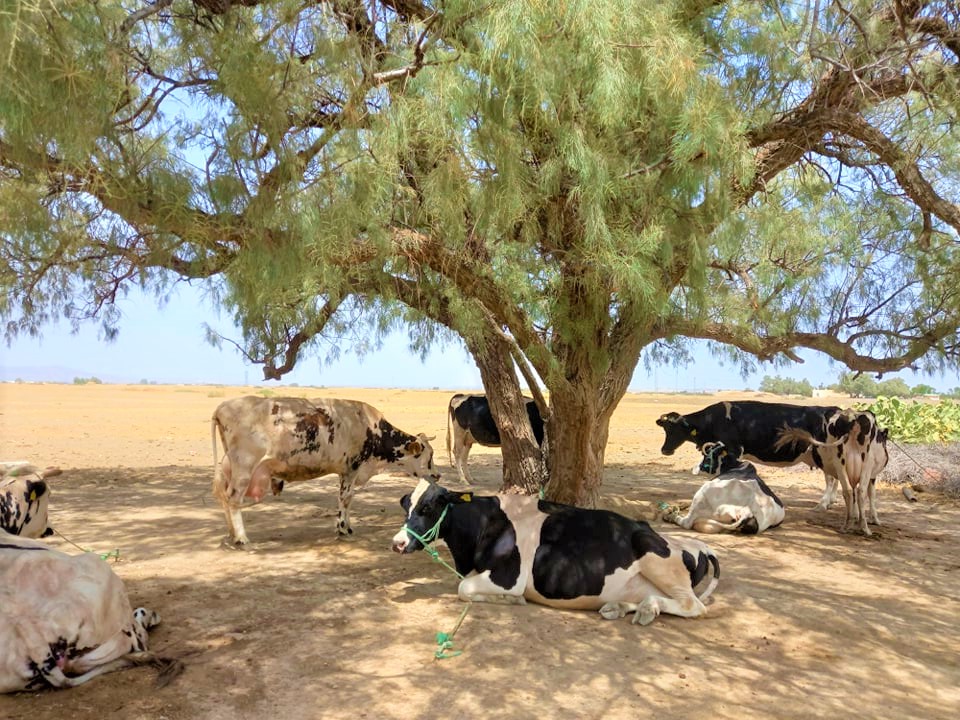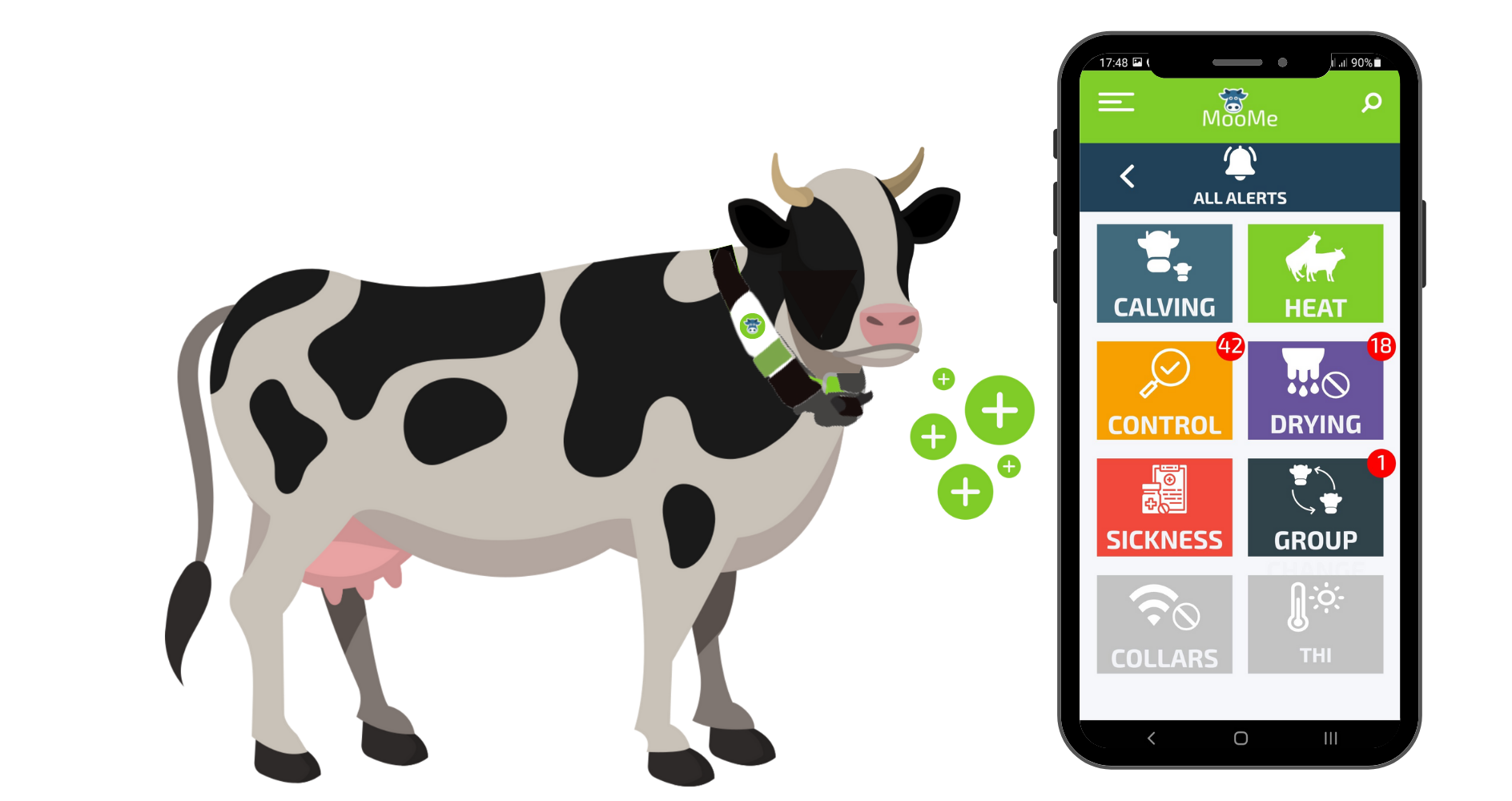
Ahmed Ben Achballah grew up working on his family farm during the summertime. Today, he knows that dairy farmers can make their cows more productive if they track their health and reproductive cycles closely. But Achballah’s family didn’t do that, and neither do most small dairy farmers in Tunisia.
“With the farmers we work with right now, they may keep track in their head. They may look for signs that a cow is ready to inseminate. Or maybe when the inseminator or the vet comes, they write a couple words with chalk on the wall in front of the cow.” Because farmers do not keep good records, their milk production suffers. “This is the case in Algeria, Morocco, Egypt, too,” Achballah says. “The small and medium farmers are all using the same techniques, if you can call them techniques.”
Achballah is working to change that. With funding from the U.S. Agency for International Development (USAID), he is expanding his agri-tech startup—MooMe. Together, they are advancing the U.S. Government’s Prosper Africa initiative by driving greater U.S. investment in African innovation and entrepreneurship.
With a multipurpose app—as well as smart collars that monitor the health of dairy cows directly—MooMe intends to digitize the entire dairy value chain in Tunisia and beyond.
“We are generating a set of data that is unique in the market, and linking everybody in the dairy value chain,” Achballah says. He believes that if every part of that chain—farmers, agronomists, inseminators, veterinarians, producers, and distributors—is working with good data, it will lead to increased production, higher quality milk, better incomes, and more jobs.
A Sizeable Market Opportunity
Trends in population growth and consumer behavior are on MooMe’s side. “In Africa, we all know that the population will increase, and we are going to need more food. Dairy products can help fill that gap,” he says. In the United States and much of Europe, the average person consumes more than 200 kilograms of milk every year. “In Tunisia, we are at 150 or 160 kilograms,” he says. “In Africa overall, we are at 15. So, there is a large gap.”
At the same time, consumers across the African continent are demanding more dairy. “If you look to the culinary habits in sub-Saharan Africa, in South Africa, they are changing,” says Achballah. “They are switching from powdered milk to fresh milk. They’re switching to cheese, to yogurt.”
“In 2020, the revenue from fresh milk and dairy products in Africa was about 48 billion dollars, with an increase of 12% year on year,” he says. As part of the Prosper Africa initiative, USAID is helping MooMe seize this business opportunity and connect with investors who want to do the same.
Connecting Investors with Businesses Across Tunisia
USAID’s Mission in Tunisia supports small and medium-sized businesses that can solve local problems, drive economic growth, and create jobs. These efforts advance the whole-of-government Prosper Africa initiative by connecting entrepreneurs in many African markets with investors who can help their businesses grow.
Achballah is one of these entrepreneurs. With USAID funding, CrossBoundary Advisory and startup accelerator Flat6Labs are enabling MooMe—and other Tunisian businesses—to raise additional capital.
Together, we are providing Tunisian businesses with advisory support and help engaging investors. We have also partnered to establish a $400,000 first-loss tranche mechanism to increase access to finance for early-stage Tunisian companies. As participating enterprises secure private investment, they become eligible for additional funding through this mechanism.
MooMe successfully raised $148,000 from the Startup Maxula Seed Fund and Anava Seed Fund. As soon as it secured this first investment, it also became eligible for an additional $9,250 from the first-loss tranche. “This support from USAID extended our runway for a month and a half,” says Achballah, “and believe me, a month and a half in the life of a startup is very, very important.” Extra runway can allow a management team to invest in a startup’s growth ahead of their next fundraising round, potentially increasing the company’s valuation and attractiveness to investors and giving entrepreneurs time to engage the right ones. Now, MooMe is working to attract international investors, especially those who have previously invested in agri-tech startups and will therefore understand the opportunity.
MooMe’s continued growth would allow the company to create more high-quality jobs in Tunisia—for agronomy engineers, software developers, artificial intelligence scientists, and salespeople.
Over time, Achballah also hopes to expand the business to other countries in the region. The MooMe team developed the app in a way that makes it easy to adapt it and offer it in any language or dialect within 24 hours. “We are creating a new model, and it’s a model that we can export to Algeria, to Morocco, and other countries,” he says.
Transforming Tunisia’s Dairy Industry
“The challenge here [in Tunisia], at the farmer level, is how to make accurate decisions about reproduction and how to be able to detect diseases at early stages,” says Achballah.
MooMe provides farmers with smart collars and a tracking app to analyze data from their dairy cows. This helps them identify disease early and time insemination accurately, improving the productivity of their herds. When farmers start using MooMe, “what happens is that they’re able to detect problems very, very, quickly. They get notified,” says Achballah.

The sensors track how much time each cow spends lying down or standing, as well as time the cow spends ruminating. If a cow is ruminating less or resting more than usual, it can be an early warning sign that something is wrong, says Achballah. “So, we tell the farmer: Go check your cow.” Data like this can also be helpful after a cow has been treated for an illness, ensuring that cows have enough time to recover or heal fully before they return to the milking operation.
The app also helps farmers schedule insemination more accurately, which is critical for the procedure’s success, and ultimately for farmers’ finances. “Each day without pregnancy is costly for them,” says Achballah, but when farmers use MooMe, “they reduce their time from calving to the first positive insemination.”
MooMe enables farmers to work more effectively with veterinarians and advisors from the dairy industry. They can make better decisions together that are rooted in solid data. Agronomy engineers from MooMe call farmers to ensure they know how to input data correctly, interpret alerts, and decide what action to take in response. Once the milk leaves the farm, MooMe also helps collection centers manage quality and prevent losses, for example by monitoring cooling, agitation, and cleaning in their milk tanks.
MooMe is part of a wave of tech-enabled startups operating in Tunisia and across the African continent. They are creating homegrown solutions to local problems, often by leapfrogging over technologies used in other markets. Through the Prosper Africa initiative, the U.S. Government is committed to supporting this thriving culture of entrepreneurship, which presents opportunities for African businesses and American investors alike.
To learn more about how the U.S. Government can help you take advantage of these opportunities, visit ProsperAfrica.gov.

